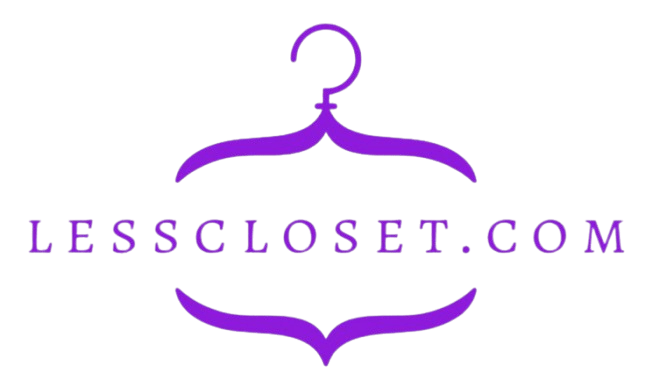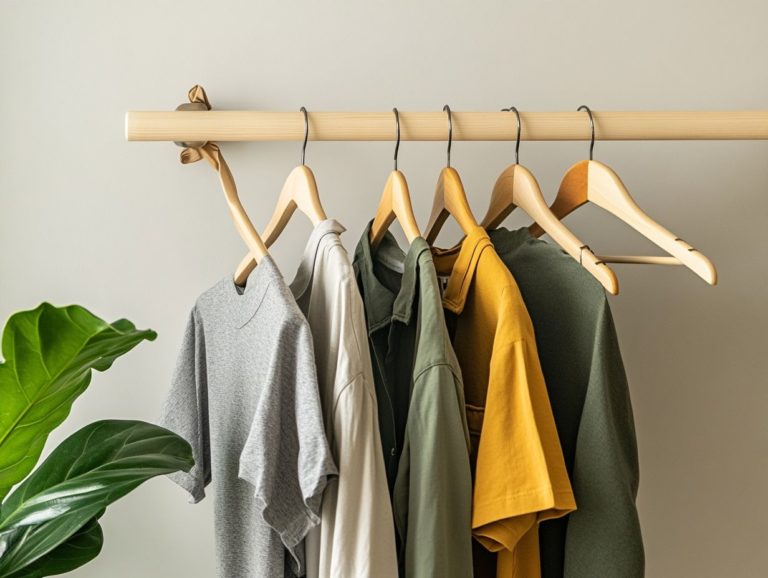7 Minimalist Clothing Brands That Prioritize Sustainability
In a world that is becoming increasingly aware of the environmental impact of fashion, minimalist clothing brands are at the forefront of the movement toward sustainability.
This article highlights seven standout clothing brands—Everlane, Patagonia, Reformation, People Tree, Eileen Fisher, Kotn, and Amour Vert—that embrace minimalist designs while prioritizing eco-friendly practices. These brands ensure their collections feature timeless pieces.
We will explore what distinguishes these brands, their commitment to social responsibility, and how they educate consumers about sustainable choices.
Join us as we delve into the challenges they encounter and their future goals in promoting a more sustainable fashion industry, including reducing textile waste and enhancing community support.
Contents
- Key Takeaways:
- 1. Everlane
- 2. Patagonia
- 3. Reformation
- 4. People Tree
- 5. Eileen Fisher
- 6. Kotn
- 7. Amour Vert
- What Makes These Brands Sustainable?
- How Do These Brands Incorporate Minimalism into Their Designs?
- What Are the Environmental and Social Impacts of These Brands?
- How Do These Brands Educate Consumers about Sustainable Fashion?
- What Are the Challenges These Brands Face in Maintaining Sustainability?
- How Can Consumers Support These Brands and Their Mission for Sustainability?
- What Are the Future Goals of These Brands in Terms of Sustainability?
- Frequently Asked Questions
- 1. What are some examples of minimalist clothing brands that prioritize sustainability?
- 2. Why is it important for clothing brands to prioritize sustainability?
- 3. How do minimalist clothing brands prioritize sustainability in their products?
- 4. Are these minimalist clothing brands more expensive than non-sustainable brands?
- 5. Can I be fashionable while still supporting sustainable clothing brands?
- 6. How can I make sure the minimalist clothing brands I support are truly sustainable?
Key Takeaways:
- Everlane, Patagonia, Reformation, People Tree, Eileen Fisher, Kotn, and Amour Vert are leading clothing brands that prioritize sustainability through their designs and production processes.
- These brands incorporate minimalism by focusing on timeless and versatile pieces, using sustainable materials, and promoting conscious consumerism through their clothing collections.
- They have a positive environmental and social impact, including reducing carbon emissions, supporting fair labor practices, and promoting ethical sourcing.
1. Everlane
Sustainable Focus: Everlane is a pioneer in sustainable fashion, recognized for its commitment to transparency and ethical production practices. The brand offers timeless pieces that embody a minimalist clothing aesthetic.
Everlane’s emphasis on sustainable materials and responsible sourcing guides consumer choices within the fashion industry, appealing to those who seek clothing that is both stylish and environmentally friendly. The use of organic cotton and recycled fabrics in its garments is a key aspect of Everlane’s sustainable approach.
Minimalist Aesthetic: Everlane’s clothing collection features versatile pieces, ranging from classic t-shirts to structured outerwear, designed to endure in both style and quality. By prioritizing high-quality materials and production techniques, these garments promote a circular economy, a system where products are reused, recycled, or refurbished, encouraging consumers to select longer-lasting items that can be reused or recycled, thereby minimizing waste in the fashion industry.
2. Patagonia
Patagonia is recognized as the most sustainable clothing brand in the world, thanks to its use of recycled polyester, organic cotton, and other environmentally friendly materials.
The company has developed innovative recycling programs and supports grassroots organizations focused on protecting the environment. Patagonia encourages community awareness and responsibility regarding environmental protection.
These initiatives illustrate how responsible brands can innovate by utilizing eco-friendly materials and ethical production processes. Patagonia minimizes textile waste while promoting environmental consciousness.
The use of durable fabrics and low-impact dyes by Patagonia reflects a holistic approach to fashion sustainability.
3. Reformation
Reformation is a pioneer in the eco-friendly fashion industry, successfully blending modern designs with sustainable practices to create fashionable clothing for today’s audience.
By emphasizing vintage fashion and promoting the use of timeless pieces, the brand challenges the fast fashion narrative and enables consumers to make choices that support sustainability. Their unique model advocates for the use of sustainable materials, such as organic cotton and bamboo fabric, while prioritizing transparency in their production processes.
Empowering consumers to choose ethical fashion is at the heart of Reformation’s mission. This approach not only emphasizes aesthetics but also fosters a lifestyle where style and sustainability coexist harmoniously.
Through engaging content, social media, and workshops, the brand cultivates a community of like-minded individuals who are passionate about its mission. Ultimately, Reformation aims to transform how fashion consumers perceive the industry.
Join the movement towards sustainable fashion today and make choices that matter!
4. People Tree
People Tree is an ethical fashion brand that creates stylish clothing while advocating for community support and women’s enablement through fair trade practices. They use natural fabrics to minimize their environmental footprint, offering high-quality garments sought after by those who wish to live consciously.
The brand’s transparent supply chain ensures that every piece is produced under humane working conditions, often enabling artisans in developing communities. Their collection features essential wardrobe items, including both casual wear and tailored pieces to suit various tastes and occasions.
This amazing selection showcases the brand’s passionate commitment to sustainable practices and their belief in the power of community support to create opportunities and foster relationships that uplift those involved in the textile production process.
5. Eileen Fisher
6. Kotn
Kotn is a fashion brand that utilizes organic cotton and emphasizes ethical production to offer comfortable apparel with a modern minimalist design. By prioritizing sustainable practices, Kotn produces stylish clothing that highlights the urgent need for better environmental care within the textile industry.
The brand goes beyond just fabric; it carefully selects high-quality materials sourced from regions where cotton is cultivated responsibly, ensuring that each piece fits seamlessly into a capsule wardrobe (a small collection of versatile clothing that can be mixed and matched). Kotn supports community projects that enable local farmers and promote education, reflecting the values of conscious consumerism.
This holistic approach not only advances ethical fashion but also educates customers, empowering them to make impactful choices now while underscoring the significance of sustainability and social impact with every purchase.
7. Amour Vert
Amour Vert is a dedicated sustainable fashion brand that focuses on eco-friendly materials and the development of ethical supply chains to minimize environmental impact. They create stylish and versatile clothing that caters to the needs of conscious consumers while adhering to the principles of slow fashion.
Their innovative use of low-impact dyes not only enhances the aesthetic appeal of their garments but also significantly reduces the harmful effects typically associated with textile production. By prioritizing this eco-conscious production method, the brand addresses the pressing challenge of textile waste, a major issue in today’s fashion industry.
What Makes These Brands Sustainable?
Everlane, Patagonia, and Reformation exemplify sustainability through their use of eco-friendly materials and ethical production processes, establishing themselves as leading brands in the sustainable fashion industry.
By utilizing organic cotton, recycled materials, and low-impact dyes, these brands minimize their environmental impact and set a standard for sustainable fashion practices.
Their emphasis on transparency in supply chains ensures that the labor practices involved are ethical and humane, a concern that has become increasingly important to consumers who prioritize the social implications of their purchases.
Additionally, initiatives that support local communities, such as funding for artisans and environmental conservation projects, further demonstrate their commitment to the social dimensions of sustainable fashion.
As a result, consumers are often more inclined to support brands that align with their values, extending beyond just product offerings.
How Do These Brands Incorporate Minimalism into Their Designs?
These brands are redefining style with a minimalist approach by emphasizing timeless pieces and versatile styles that transcend fleeting fashion trends. This strategy appeals to consumers seeking simplicity and functionality in their wardrobes.
By aligning with sustainable fashion principles, they enhance personal style through quality items that stand the test of time. Instead of focusing on overproduction, these brands promote mindful consumption.
For example, a well-tailored trench coat can be worn across multiple seasons; its quality and neutral color allow it to complement various outfits. Many footwear options include minimalist sneakers made from sustainable materials, reducing environmental impact while offering versatility.
Through these innovations, these brands show how functional and stylish designs can encourage mindful consumerism.
What Are the Environmental and Social Impacts of These Brands?
The environmental and social impact of brands like Eileen Fisher and Patagonia is significant, as they embrace fair and responsible ways to make clothing and prioritize sustainability in their operations. This approach positively affects the fashion industry as a whole.
These brands aim to minimize their environmental footprint and uplift communities through fair labor practices and empowerment programs. For instance, Eileen Fisher’s ‘Renew’ program invites customers to send back used items for reweaving, promoting a circular economy and reducing waste.
Similarly, Patagonia’s commitment to environmental activism is exemplified by its funding program for grassroots organizations dedicated to protecting the planet. These initiatives are crucial for attracting a rapidly growing base of conscious consumers who prioritize ethical choices in their purchases.
The transparent communication of these efforts solidifies the brands’ identities as leading examples of sustainability, engaging a demographic that values social responsibility and environmental stewardship.
How Do These Brands Educate Consumers about Sustainable Fashion?
These brands promote consumer awareness of sustainable fashion by utilizing various platforms to educate individuals about ethical production and sustainable choices. This enhances understanding of sustainable practices, enabling their audience to make decisions that benefit both themselves and the environment.
Through experiential workshops, they offer hands-on learning opportunities and foster a community of ethically-minded shoppers. Social media campaigns serve as dynamic platforms for brands to share stories, tips, and behind-the-scenes insights that highlight the journeys of their sustainable products.
Website content focused on consumer awareness makes complex topics easier to understand, allowing consumers to educate themselves at their own pace. Collectively, these initiatives significantly contribute to raising consumer awareness and cultivating a more informed consumer base inclined to support brands aligned with their values.
What Are the Challenges These Brands Face in Maintaining Sustainability?
Brands like Kotn and Amour Vert face several challenges in the textile industry, despite their commitments to sustainability. These challenges include sourcing sustainable materials, upholding ethical production standards in a competitive market, and navigating supply chain logistics. Such obstacles hinder their ability to fully achieve their sustainability goals.
Consumer expectations for transparency and efficiency among fashion brands are rising, while increasing costs for eco-friendly materials and ethical labor practices pose significant challenges. This pressure makes it difficult for these brands to keep prices competitive compared to fast-fashion options.
To mitigate these challenges, brands are adopting innovative supply chain strategies, partnering with local artisans, and emphasizing the importance of storytelling and product marketing. By aligning closely with consumer values and effectively communicating their sustainable practices, these companies aim to meet demand while educating consumers about the significance of ethical consumption.
Explore these brands today and discover how you can make responsible fashion choices!
How Can Consumers Support These Brands and Their Mission for Sustainability?
Join the movement! By choosing brands like People Tree and Reformation, you can make a real difference. Embrace conscious consumerism and focus on ethical fashion practices that prioritize sustainability and social responsibility.
Investing in high-quality garments from these eco-friendly brands significantly impacts the fashion industry and promotes environmental sustainability. You can further enhance your influence by opting for products from these brands’ eco-friendly product lines, made from materials that are better for the environment and produced under ethical labor practices.
Sharing information about ethical fashion on social media platforms helps raise awareness and encourages others to adopt similar behaviors. Creating capsule wardrobes, which consist of timeless essentials, reduces waste and promotes slower fashion cycles.
Collectively, these actions not only support sustainable brands but also contribute to a broader movement toward a more responsible and inclusive fashion industry, benefiting both the planet and its people.
What Are the Future Goals of These Brands in Terms of Sustainability?
The future goals of brands such as Amour Vert and Everlane focus on enhancing sustainability initiatives. They aim to incorporate more eco-friendly practices and expand their impact within the fashion industry.
These brands aspire to innovate further in low-waste production, responsible sourcing, and community engagement to foster a circular economy. They will explore the use of advanced sustainable materials, including organic cotton and recycled fabrics, which significantly reduce environmental footprints.
These brands will also establish partnerships with environmental organizations to bolster advocacy efforts and amplify their voice in promoting sustainability. Educational campaigns are also in the works to raise consumer awareness about the importance of ethical fashion choices and cultivate a collaborative movement toward more conscious shopping.
Watch the video above to learn more about these exciting developments!
Frequently Asked Questions
1. What are some examples of minimalist clothing brands that prioritize sustainability?
Some examples include Everlane, Patagonia, and Reformation.
2. Why is it important for clothing brands to prioritize sustainability?
Prioritizing sustainability helps reduce negative environmental impacts, promotes ethical practices, and creates long-lasting, high-quality products.
3. How do minimalist clothing brands prioritize sustainability in their products?
They use eco-friendly materials, implement ethical production practices, and promote a circular economy through recycling and upcycling.
4. Are these minimalist clothing brands more expensive than non-sustainable brands?
Minimalist clothing brands that prioritize sustainability may have slightly higher prices due to eco-friendly materials and ethical practices. However, this often reflects the quality and longevity of the products.
5. Can I be fashionable while still supporting sustainable clothing brands?
Absolutely! Minimalist clothing brands often offer trendy and stylish options that are also eco-friendly and ethically made. You can make a fashion statement while supporting sustainable practices.
6. How can I make sure the minimalist clothing brands I support are truly sustainable?
Research their production practices, materials used, and certifications they may have. Look for certifications like Fair Trade, GOTS, and B Corp to verify their commitment to sustainability.



